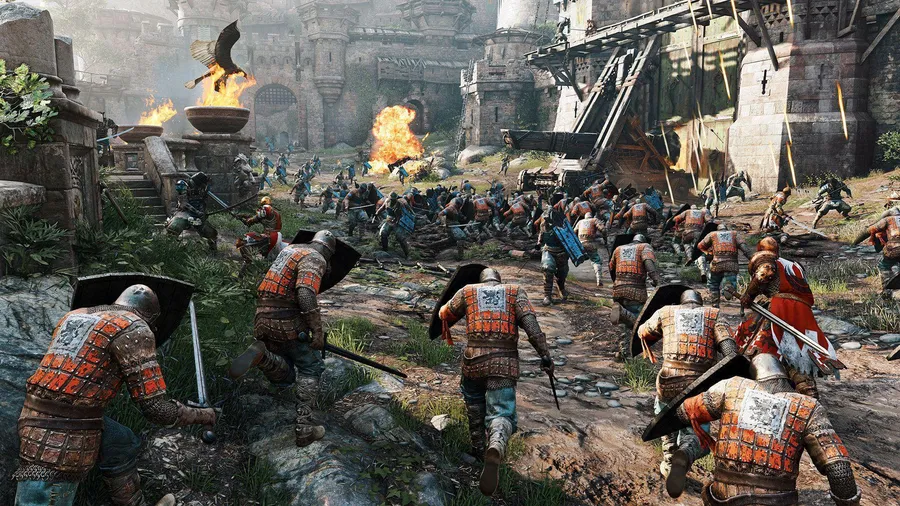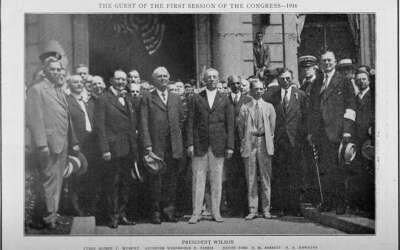Are You A Sales Leadership “Dunderblitzen”?
Adapted from Worthington C. Holman from the February of 1909 edition of The Business Philosopher
 Have you ever heard the story of Dunderblitzen Von Shoosh?
Have you ever heard the story of Dunderblitzen Von Shoosh?
Probably a thousand years ago, during “medieval” war times, there was an old army fighter named Dunderblitzen Von Shoosh. He was a heralded fighter, known as a “champion heavyweight skull-splitter” of his time. There was nobody better – as it was said he could crack open a warrior’s suit of protecting armor with his battle-axe more deftly than a modern butcher man forces an entrance into a tin of Mrs. Heinz’s beans with a can-opener. An army lifer, being the best fighter had been his specialty for over twenty years – it came easy to him.
He had earned his way up to troop captain, so basically like a team leader in a business environment. A player-coach, he had swung his sword probably ten thousand times.
His army had just won a significant battle, liberating a city that needed liberation. The bad news, however, was that all of his superiors had lost their lives in the fight. The only captain left to become the army’s general was Von Shoosh.
Dunderblizen Von Shoosh’s fighting abilities were never questioned. However, had he ever been a leader of an army? Nope. But it was now up to him to lead – to defend and protect the city they had just fought for.
Immediately after the victorious battle followed by his appointment as supreme leader, opposing armies arrived vowing to retake the city they had lost. The city was circled and protected by a wall which was approximately four miles in circumference, and over a mile in diameter. The first assault by the opposing army came via the main entrance.

Dunderblizten rallied his army, blew through the main entrance gate, and successfully defended the city by blowing back the foe far out into the countryside.
Returning in triumph, he was greeted with the news that another sect of the opposing army was attacking via the wall on the opposite side of the city.
Dunderblitzen took his army through his city’s bending streets, met the opposing army, and took them down once again with overwhelming force. Successful again.
Exhausted, he and his army rested, but that night, the enemy made a third attack. Von Shoosh, sleeping in his armor, rolled off the bench with which he was sleeping, sent messengers to wake up his soldiers, battled the opposing army once again, and once again won.
The relentless attacks did not stop. Morning, noon, and night, the opposing army assaulted the walls of the city Dunderblitzen was in charge of protecting, He rushed his soldiers back and forth across the city, with himself at the helm, repelling these attacks.
After two or three days and nights of these random battles, the soldiers started to complain. They couldn’t take the pace. The effort of chasing through the crooked streets of the city was as exhausting as the fighting itself. Some of Dunderblitzen’s officers got together and put together a plan to convince him to change his approach. They requested a “council of war”, which is simply a term for a meeting of officers during an emergency.
Dunderblitzen roared, “Council nothing! I have a council of war going on in my head every moment I’m awake. That’s council enough for this outfit. I’ll do the counseling and you do the jumping when I command. That’ll be about all I care to hear from you this morning!”
The random battles continued, and within days a series of calamities finally changed Dunderblitzen’s opinion of having a council. Half of his army was now incapacitated. Famine had gripped the city. The water supply was short. Mutiny was imminent, and every day the enemy’s attacks were growing stronger while his army’s resistance was getting weaker. Dunderblitzen requested the council himself.
“Things are going wrong,” he admitted. “What can we do to save the city?”
One of the older officers replied, “Are we free to speak, general?”
Dunderblitzen pounded the table, “Free as air! Speak out! Open up!”
“You’ll hear us through?”
“To the last word!”
“Well, then,” said the fearless gray-bearded officer. “Why do you spend your time leading fights in person, instead of in planning the general defense of the city? You delegate no authority to subordinates. You have made no study of the strategic strength or weakness of the city as a whole, no plan to protect at all times all the places open to attack. You have no map of the city’s entire defenses. There are towers and battlements you have never visited. There are weak places in the wall that you have never inspected. You have called for no reports on any of these matters. The safety of the city lies in having a directing eye that sees everything going on – someone that plans to guard every part of the city wall, and leaves the actual fighting at various points to troop-captains – like me. As a personal sword swinger, you add the strength of three ordinary men-at-arms to the defense, but as a supreme strategist planning the general conduct of the defense you might triple the effectiveness of the entire thousand men in your army.”
Dunderblitzen stood up, glaring at the officer, and obviously agitated at the feedback. The officer snapped, “You said you’d hear us out!”
Von Shoosh sank back into his chair.
Another captain stood up. “You are always so taken up with the fight of the moment that you never have time or attention to give to preparing for the emergencies of tomorrow,” he said. “What’s the use of a glorious victory on Monday if we win under conditions that weaken us so we lose in a fight on Tuesday? The siege is not for a day, but for a week, maybe a month or a year. Who knows? The planning must not be for a day at a time but for all the days that the enemy is in the field.”
Dunderblitzen’s thick brain was finally penetrated, his tongue motionless.
“You let the enemy lay out your day’s work for you,” said another officer. “All he has to do is make an assault somewhere, and away you go to repel it. Meanwhile, you neglect a hundred other things that ought to have your attention. A good general doesn’t let the enemy decide for him. He devises the strategy, lays out his own day’s work, and follows it through uninterruptedly to the end.”
“There are many things besides the actual fighting that a general must think of, “ added another officer. “There is the question of supplies. Here we are face-to-face with famine because you have given no attention to saving and protecting our resources. We have had nobody bringing in new supplies, there’s no commissary, no medical department. You’ve been so busy hammering heads or sleeping off your fatigue, you’ve missed everything else that requires strategy and attention.”
The conversation continued to devolve for Dunderblitzen. One officer proclaimed he have “a memory like a sieve, a brain like a mud turtle, the power of initiative like a clay bank,”
“No man can talk to me like that!” he yelled.
“Sit down!” shouted another captain. “There is no one man talking to you now. This entire council is talking to you. You asked for our opinion, and we are here to give you our honest answer. The first thing to be done is for you to resign the leadership and appoint a general in your place. Then you go back to being a captain of a troop and mix it up in hand-to-hand fights until you reek in gore. As a skull-cracker, you are a wonder, but as a general, it is the unanimous opinion of this council that you are a large and juicy lemon.”
Did he resign? He sure did. When the council adjourned, there was a new leader in place. And for Dunderblitzen? He left a sadder and wiser man, now leading a troop as a captain.
Dunderblitzen – the leadership world is full of them, right? I mean…I was a Dunderblitzen after my first promotion into revenue leadership. Promoted because of the skill possessed in doing one role, but without training, structure and framework with which to strategize, they often don’t figure it out until after the war is over…and they’ve lost.
Dunderblitzens end up rattling around doing the work of the front lines when they should be leading! Leaders who try to run every last part of their businesses or departments themselves, staggering under a load of detail, constantly engaged in hand-to-hand struggles with routine matters, failing to step back to plan and strategize.

Worthington C. Holman – the first known storyteller of Dunderblitzen
Worthington C. Holman proclaimed, “Such a man is not a business strategist, but a business pack-horse; not a business eagle, hovering on easy wings, with a keen eye on every happening in the field of operations below, but a business camel, prone on the plain, with his head buried deep in the sand, and blind to what is taking place about him.”
Are you a Dunderblitzen – letting outsiders and outside forces lay out your day’s focus for you? Are you relinquishing your power and requirement of initiative to become a passive prisoner to the enemy?
Was this your story, too?
Getting promoted to my first sales leadership role was a massive goal achieved for me. But those first few days – I was a Dunderblitzen. I felt like a dog chasing a car down the street, never knowing what direction it was headed. I was a prisoner to whatever turn the car was taking, never thinking strategically about the overall foundation of revenue capacity.
The bigger problem? What foundation? Where would I even begin? Nobody ever taught me a structure for revenue leadership. I always had a sales process as a seller, and a whole team behind me in the same role to learn from. As a leader, I was on an island.
I created a framework…I called it the Five F’s of Building Revenue Capacity. It’s the foundation for the book, The Transparent Sales Leader, but it really applies to anyone in a revenue leadership capacity. A simple way to see your entire revenue organization, to plan, strategize, communicate and see the holes before they form.
I loved this story and its connection to leadership – applied so fantastically in the early 1900s, but still just as applicable today.
Don’t be a Dunderblitzen

I speak and teach revenue organizations on how to leverage transparency and decision science to maximize their revenue capacity. It’s what I do…teach sellers, their leaders, and really entire revenue organizations how we as human beings make decisions, then how to use that knowledge for good (not evil) in their messaging (informal and formal), negotiations, and revenue leadership. I wrote a 3x award-winning book (𝘛𝘩𝘦 𝘛𝘳𝘢𝘯𝘴𝘱𝘢𝘳𝘦𝘯𝘤𝘺 𝘚𝘢𝘭𝘦), and have a newish book out (𝘛𝘩𝘦 𝘛𝘳𝘢𝘯𝘴𝘱𝘢𝘳𝘦𝘯𝘵 𝘚𝘢𝘭𝘦𝘴 𝘓𝘦𝘢𝘥𝘦𝘳) now that just won its first award!
Sign up for the newsletter for more of my nonsense in your inbox every other week, with some sales history sprinkled on top…Sign Up – The Transparent Newsletter





0 Comments